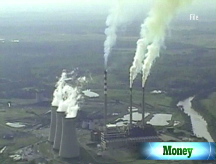Putting a price tag on your polluting
There may be a better solution to the energy crisis than cries for cheaper fuel. But you're probably not going to like it.
 |
| Pat Regnier's column "The Bottom line," appears monthly in Money Magazine. Email him at pregnier@moneymail.com |
| MMA | 0.69% |
| $10K MMA | 0.42% |
| 6 month CD | 0.94% |
| 1 yr CD | 1.49% |
| 5 yr CD | 1.93% |
(Money Magazine) -- I separate my paper and plastics. I take the train to work instead of driving, and I'm definitely going to buy a bunch of those screwy lightbulbs one of these weekends. And...well, when it comes to being green, I guess that's about it.
I may have loads of good intentions about being a better environmental citizen, but all too often my short-term economic interests run in the other direction. The problem is that polluting is a bargain (for the polluter, that is).
It just doesn't cost very much to run my AC a little colder on a hot night. Sure, everyone else on the planet pays in terms of carbon dioxide emissions that speed up climate change - but no one ever sends a bill for that.
On a bigger scale, the utility that provides the juice makes the same calculation when it chooses to burn relatively cheap fossil fuels over, say, wind power. In the absence of direct consequences, why sweat it?
That kind of reasoning is why economists and environmentalists agree on the need to put a price tag on carbon emissions. They've been saying so for years. What's different now is that the presidential candidates from both parties are saying it too.
John McCain, Barack Obama and Hillary Clinton all support creating a system called cap-and-trade for controlling emissions. Although the Democrats aim to cut a lot more carbon than McCain, all the plans share the same basic approach.
The government would set a limit on green-house gases and issue permits big users or sellers of fossil fuels would need for a set amount of emissions. Those permits could be bought and sold on the market.
It's all a bit Rube Goldberg, but the result is easy to grasp: Pumping carbon into the air starts to get expensive. Cleaner fuels and investments in green tech will look more attractive.
For you, this will amount to a tax. The Congressional Budget Office estimates that a program reducing emissions by 15% could cost a middle-income household about $1,000 a year.
Here's why: Although we tend to think of polluters as utilities, oil drillers and factories, they're just producing stuff you and I buy. Once there's a price on carbon, you can bet they'll pass that on to us too, says economist Chad Stone of the Center on Budget and Policy Priorities.
Naturally, the candidates don't dwell on this point; they mostly talk about the impact on polluting businesses. McCain's Web site, for example, explains cap-and-trade with a cartoon of smokestacks being replaced by cheerful little windmills.
Now, that $1,000-plus cost estimate shows just one side of the ledger. The true burden could be much smaller. If the government auctions off carbon permits rather than giving them away to industry - a big if - it could easily generate revenue of $100 billion or more a year.
That cash could be used to lower other taxes or to reduce the deficit. An explicit tax on carbon, the alternative advocated by wonks ranging from Al Gore to former Bush economic adviser Greg Mankiw, would do pretty much the same thing.
Either way, like "sin" taxes on cigarettes, a carbon pricing system is regressive, which means it hits lower-income people harder. So economist Stone argues for targeted rebates to low- and middle-income families. Others recommend lowering another regressive levy: the payroll tax on work.
"It would be a shift away from taxing things we like to taxing things we don't like," says Tufts University economist Gilbert Metcalf. Not to mention avoiding a possible climate catastrophe.
The trade looks nice on paper. But nobody likes to hear that their electric bill, or the price of anything else that uses carbon, is going to go up. "Most Americans aren't sure what they pay in payroll taxes, but they're acutely aware of what they pay at the pump," says Joseph Thorndike, director of the Tax History Project. "It's hard to just say 'We promise it will even out.' "
Then again, as Charles Komanoff of the Carbon Tax Center notes, the McCain and Clinton proposals for a gas-tax holiday fizzled. Maybe we're learning that there's more to smart energy policy than cheap fuel. Time to turn down the AC. ![]()



